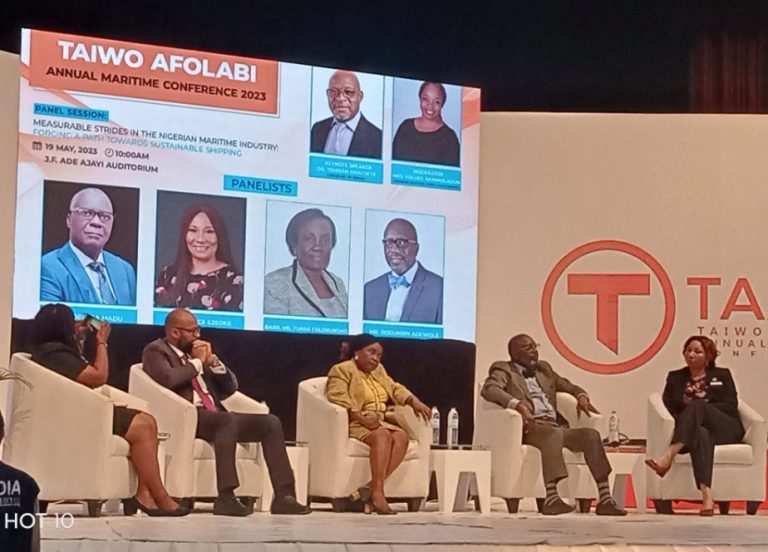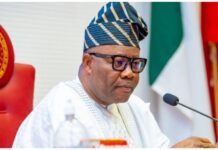By Chiazo Ogbolu
A renowned maritime lawyer and Senior Partner of Akabogu & Associates, Dr Emeka Akabogu, has described the implementation of Cabotage as a huge failure.
Akabogu said this during a panel discussion at the fifth Taiwo Afolabi Annual Maritime (TAAM) conference on Friday in Lagos.
The conference organised by SIFAX Group in collaboration with the Maritime Forum, University of Lagos had the theme: The Maritime Roadmap Project – Making Nigeria a Leading Maritime Nation in the World.
The News Agency of Nigeria (NAN) reports that Nigeria made a bold attempt to change the face of maritime business within its coasts when it enacted the Coastal and Inland Shipping (Cabotage) Act 2003.
The objective of the Cabotage Act is primarily to reserve the commercial transportation of goods and services within Nigerian coastal and inland waters to vessels flying the Nigerian flag and owned by persons of Nigerian citizenship.
Akabogu said that operators had not benefited from the initiative.
“The Nigerian Maritime Administration Agency (NIMASA) is responsible for the implementation of the Cabotage, which came with a lot of hope but it has been a huge failure.
“It is a failure because what should be of advantage to Nigerians has clearly not been implemented.
“Nigerian shipowners invested in ships because they believe in Cabotage but however, faced disappoinment of government not implementing Cabotage measures which has resulted in foreign shipowners competing in our domain.
“The Cabotage Vessel Financing Fund (CVFF) which has been accumulating by shipowners since 2004 to date has not been disbursed for once. It is disgraceful and there is no explanation which can be justified,” he said.
He pointed out that it was in view of this and many others that it would be difficult to determine what could be justified as measurable achievements by the maritime industry.
Akabogu, however, noted that from the port point of view, the only significant measurable stride was the concession of the ports to private terminal operators in 2006.
He said that the private sector operators such as SIFAX had significantly contributed to the development of the Nigerian maritime space.
On what could be done with regards to NIMASA Act, and the Merchant Shipping Act, Akabogu who described NIMASA Act as a highly useful instrument said it needs to be implementation.
“NIMASA Act makes provision for maritime fund which is 25 per cent of the income that NIMASA generates and this fund should go to the development of the Nigerian maritime space across board.
“This is separate from the CVFF in the Cabotage Act which should go exclusively for the development of ship owning capacity.
“What is being done by NIMASA with this 25 per cent maritime fund within the context of the law?
“Today we have NIMASA significantly investing in projects which should be undertaken by humanitarian agencies and not investing in those project which are of long term sustainable value to the Nigerian maritime industry,” he said.
He pointed out that another issue NIMASA should be concerned about was the national carrier status.
On the Merchant Shipping Act, Akabogu called for a technical guide that would ensure the implementation of safety and security standards.
This, he said, would ensure that ships coming to Nigeria were not delayed unnecessarily.
“Going forward, as an industry, we need to start becoming more responsible, private sector should not shy away from holding public servants accountable, Nigerian shipowners should work with acceptable minimum standards to ensure that there is confidence in the system.
“The freight forwarders association have done a lot of disservice to the Nigerian maritime industry as a result of continued backlash among themselves, they also need to adopt technology which will lead to having a single window in port,” he said.
Also, Dr Adewole Bodunrin, the President, Maritime Arbitrators Association of Nigeria, stressed the need to establish a maritime arbitration centre in Nigeria to aid the measurable strides that would make shipping successful.
“98 per cent of Nigerian cargoes are being transported by foreign carriers and when dispute arises, Nigeria is left out because there is no arbitrary centre,” Bodunrin said.
Ms Funmi Folorunso, the Secretary General, African Shipowners Association, while speaking on having increased shipowners in Nigeria noted that “there are ships but the ships are not what the country needs in 2023.”
According to Folorunso, there is a need to set agenda for incoming administration on what the industry needs to achieve sustainable growth.
“Nigeria does not have a fleet development agenda and we need to ask ourselves if national shipping is what we require now or Nigerian shipping lines,” she said.
She urged the Federal Government to take advantage of the African Continental Free Trade Agreement (AfCFTA) for economic growth and development.
“Nigeria has a history of oil tankers. AfCFTA is not about oil tankers but cargo movement within the African states and we need to tap into it,” she said.
Also, Mrs Eunice Ezeoke, the President, Women’s International Shipping & Trading Association, said for sustainable shipping, Nigeria must develop its human capital, build and develop infrastructure such as the deep seaport.
“In acquiring vessels, it should not be sought outside, Nigeria has all the materials needed to construct the vessels, what we lack is the political will to push it forward.
“There is a need to look inward and start developing what we have, sensitise the young ones on opportunities in the industry,” she said.
NAN also reports that the TAAM conference was birthed to serve as a platform where key issues that will engender innovations and practical ideas needed to sustain growth of be maritime sector are discussed and workable solutions proffered. (NAN)




